For downsampling a signal, I use a FIR filter + decimation stage (that's practical a strided convolution). The big advantage of combining filtering and decimation is the reduced computational cost (by the decimation factor).

With a straight forward OpenCL implementation, I am not able to benefit from the decimation. Quite to the contrary: The convolution with a decimation factor of 4 is 25% slower than the full convolution.
Kernel Code:
__kernel void decimation(__constant float *input,
__global float *output,
__constant float *coefs,
const int taps,
const int decimationFactor) {
int posOutput = get_global_id(0);
float result = 0;
for (int tap=0; tap<taps; tap++) {
int posInput = (posOutput * decimationFactor) - tap;
result += input[posInput] * coefs[tap];
}
output[posOutput] = result;
}
I guess it is due to the uncoalesced memory access. Though I can not think of a solution to fix the problem. Any ideas?
Edit: I tried Dithermaster's solution to split the problem into coalesced reads to shared local memory and convolution from local memory:
__kernel void decimation(__constant float *input,
__global float *output,
__constant float *coefs,
const int taps,
const int decimationFactor,
const int bufferSize,
__local float *localInput) {
const int posOutput = get_global_id(0);
const int localSize = get_local_size(0);
const int localId = get_local_id(0);
const int groupId = get_group_id(0);
const int localInputOffset = taps-1;
const int localInputOverlap = taps-decimationFactor;
const int localInputSize = localInputOffset + localSize * decimationFactor;
// 1. transfer global input data to local memory
// read global input to local input (only overlap)
if (localId < localInputOverlap) {
int posInputStart = ((groupId*localSize) * decimationFactor) - (taps-1);
int posInput = posInputStart + localId;
int posLocalInput = localId;
localInput[posLocalInput] = 0.0f;
if (posInput >= 0)
localInput[posLocalInput] = input[posInput];
}
// read remaining global input to local input
// 1. alternative: strided read
// for (int i=0; i<decimationFactor; i++) {
// int posInputStart = (groupId*localSize) * decimationFactor;
// int posInput = posInputStart + localId * decimationFactor - i;
// int posLocalInput = localInputOffset + localId * decimationFactor - i;
// localInput[posLocalInput] = 0.0f;
// if ((posInput >= 0) && (posInput < bufferSize*decimationFactor))
// localInput[posLocalInput] = input[posInput];
// }
// 2. alternative: coalesced read (in blocks of localSize)
for (int i=0; i<decimationFactor; i++) {
int posInputStart = (groupId*localSize) * decimationFactor;
int posInput = posInputStart - (decimationFactor-1) + i*localSize + localId;
int posLocalInput = localInputOffset - (decimationFactor-1) + i*localSize + localId;
localInput[posLocalInput] = 0.0f;
if ((posInput >= 0) && (posInput < bufferSize*decimationFactor))
localInput[posLocalInput] = input[posInput];
}
// 2. wait until every thread completed
barrier(CLK_LOCAL_MEM_FENCE);
// 3. convolution
if (posOutput < bufferSize) {
float result = 0.0f;
for (int tap=0; tap<taps; tap++) {
int posLocalInput = localInputOffset + (localId * decimationFactor) - tap;
result += localInput[posLocalInput] * coefs[tap];
}
output[posOutput] = result;
}
}
Big improvement! But still, the performance does not correlate with the overall operations (not proportional to the decimation factor):
- speedup for full convolution compared to first approach: ~12 %
- computatoin time for decimation compared to full convolution:
- decimation factor 2: 61 %
- decimation factor 4: 46 %
- decimation factor 8: 53 %
- decimation factor 16: 68 %
The performance has a optimum for a decimation factor of 4. Why is that? Any ideas for further improvements?
Edit 2: Diagram with shared local memory:

Edit 3: Comparison of the performance for the 3 different implementations
